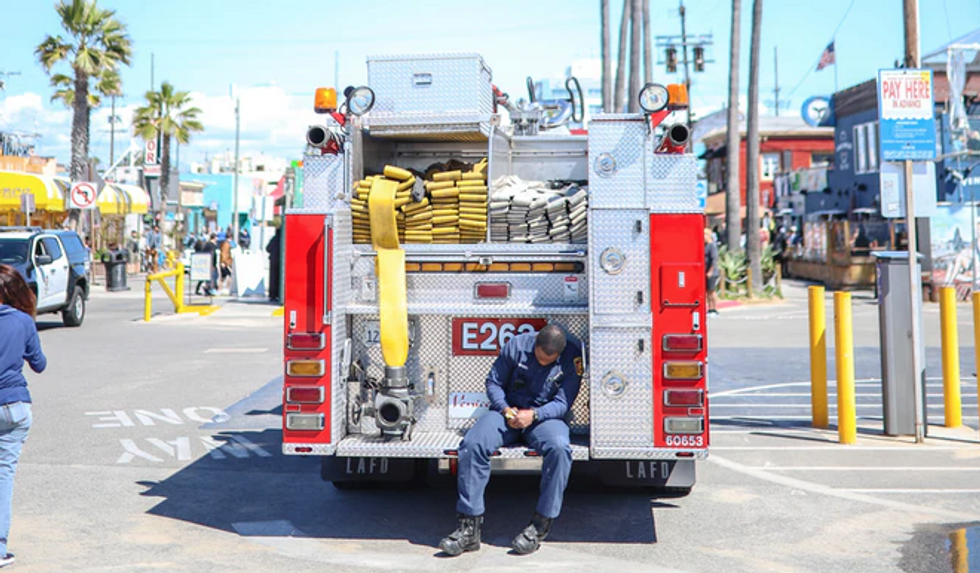Content warning: Details may be triggering.
After working for 48 hours straight, I finally make my way back to my home. My back is aching from the uncomfortable beds in the firehouse, my legs are on fire from climbing up and down the ladder, carrying out countless victims from the burning building my team and I were called out to the night before. When I finally get home, my wife and children are asleep. The house is quiet. I enter my bedroom and collapse onto the bed next to my wife, instantly drifting off to sleep.
As I slumber, my sleep is altered by horrendous dreams of fire and ash, people being suffocated by the smoke and flames.
I wake in a cold sweat most nights, a throbbing headache pulsating at the base of my skull.
The images of my dream are still vivid in my mind, evading me from sleep.
After a restless night's sleep, I roll out of bed the next morning, contemplating breakfast or trying to fall back asleep. As this feels impossible, I trudge to the kitchen and make myself a bowl of cereal. I am just about to sit down and eat when I hear my phone ring from the bedroom. I rush to answer it and see the caller ID reads "Chief." I pick up the phone. Before I even say hello, the chief has already begun talking. "It's bad. Real bad. You've got to get down to the station." Without another word, I hang up the phone, grab my keys from the kitchen counter, sprint to my truck, and speed to the fire department.
When I arrive, the chief is standing in the middle of the garage, ordering fire trucks and men around like a traffic cop. He turns to look at me. "Oh, thank goodness you're here," he exhales. "Get in Truck 8 and take a group of about five with you. This is going to be a tough one." I follow his orders, round up a handful of firemen, and head out in Truck 8. "Where are we going?" I ask one of my comrades. "Didn't the chief tell you?" one of them says back. "There was huge a wreck on Highway 39, car flipped multiple times, full of passengers. It's pretty bad."
All at once, my career as a first responder flashed before my eyes.
Each time I had been paged out to a car crash, it had been an experience I will never forget. The victims crunched beneath the vehicles, passengers ejected, body parts deformed and misshapen. It had taken me months to get over each individual crash, hoping I could sleep peacefully just one night without the mangled faces and bodies haunting my dreams. My apprehension must have been visible on my face because one of my coworkers looked at me with a questioning look. "I am fine," I said through gritted teeth. That was enough to keep the questions and looks at bay, for now. After being a fireman for fifteen years, you would think I would be able to cope better with these types of situations. In my line of work, life just seems minute, meaningless.
As we arrive at the scene of the wreck, I can already tell this is going to be the worst crash I have encountered in my time as a firefighter and first responder. After we disembark the vehicle, we cautiously walk up to the wreckage. It looks like a head-on collision between a semi-truck and a Toyota Prius. The Prius is in the ditch, while the truck is on its side. The group splits into two, one heading for the truck, the other going towards the Prius. I lead the group that is heading to the Prius. Once we get closer, we see two bodies that have been ejected from the vehicle, their heads and limbs twisted in unnatural ways. My stomach churns as I check their bodies for pulses. None to be found. My team continues searching the little Prius and what we find in the vehicle is just as devastating as what was outside. Two little car seats remained in the rear of the car, both housing once-living infants.
The entire group takes a minute to rationalize what we are seeing before the ambulance arrives to load the bodies.
I am driving home from the fire department after being told by the chief to get some rest. As I arrive home, my wife has made dinner, in hopes that I will actually be able to eat after what I have just seen. I casually shake her off and head to the shower, where I can gather my thoughts. Every time I blink, I see the lifeless looks that were plastered to their faces. A family at home now, mourning, never to see their loved ones again. That sad fact will haunt me, but it is my motivating factor to stay in this occupation. To help people in any way I can, even if that means I must suffer in the process.
















